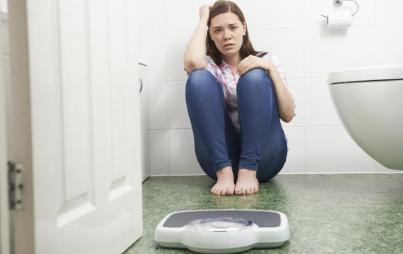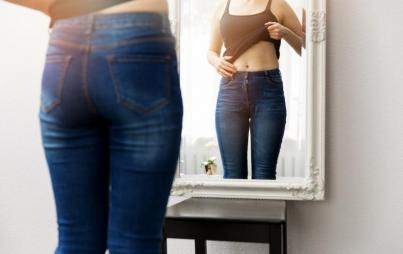
Some people just don't get it.
You will never be enough of anything if you judge yourself by society’s standards.
I want to talk about invisible illness. I want to talk about thin privilege. I want to talk about chronic illness and self-image and society’s perceptions and how all of these things intersect.
I want to talk about how we need to stop judging each other by how we look and what we assume another person’s life to be like.
I struggled with an eating disorder during almost all of my teen years. I starved myself, threw up, over-exercised, took ipecac, and abused my body in ways you couldn’t imagine in the pursuit of the ideal body image. Which, of course, I never attained because it is unattainable, and guess what? You will never be enough of anything if you judge yourself by society’s standards.
How I want to cry when I look back to those days...now that I can’t eat anything at all without horrific pain and living in the bathroom. Had I known what was coming, I would have eaten all the things! I would have enjoyed every minute of filling my stomach with delicious food and relished it all! Now I struggle with multiple chronic illnesses including gastroparesis, bile acid malabsorption syndrome, celiac disease, and interstitial cystitis. And one of the worst part? To everyone else, these are entirely invisible.
When we are suffering, we want comfort, not compliments on how great we look. Sure, it’s nice to be complimented, but honestly, it minimizes what we are going through. “How can you be sick, you look so great?” “I wish I had what you had!” “At least you are skinny!” “Oh, but you look awesome!” I don’t want to look awesome! I want to eat dinner with my family. What do I tell my daughter when she grows up and says, “If Mommy doesn’t have to eat dinner, why do I?” I don’t want to be thin if it means being alone in my house while my family is at the orchard, or avoiding the park that has no bathroom, or missing out on the Halloween store that is a 45-minute drive away, so therefore I’m not going.
These comments point to an even deeper problem in our society. Why do we have the perception that thinness is so important that it’s worth having a devastatingly painful illness in order to achieve it? Why would we think that, as women, we would be grateful for our chronic illness, because it makes us visually acceptable to society? How did we get here? If I lost a leg, would I be congratulated on my weight loss?
I can’t keep track of all the pills I take — I can’t find a pill organizer big enough for them. I can’t count the amount of money that I’ve spent (that I didn’t have) on tests, procedures, hospitalizations, and medications. I can’t count the family events that I’ve missed out on because I was too sick to leave the house. When people say things like, “I wish I had a disease that made me thin!” it’s hard not to wish them bodily harm. Those of us with invisible illnesses go through so much every day — work, school, taking care of our kids — and the average day is a challenge. Meanwhile, our pain is ignored, minimized, and trivialized because we fit society’s ideal body type, and we should somehow be grateful for that.
I recognize that my illness gives me thin privilege. I can go to a store and fit into the clothes (not that I can afford to buy them after all of my prescriptions). I do not have to worry about being insulted for my weight. But to our friends, family, and strangers who have health privilege, please think before you speak to someone with an illness that causes weight loss. To those of you who can eat whatever you want, and not get sick or need pain medication to get up off of the bathroom floor, please think before you say “at least you are skinny!” to someone with a chronic illness. Our looks are not more important than how we feel. Being thin is not the most important thing in the world. It is not “worth it” to be sick because it makes us thin. We are not happy to spend our life savings and go into medical debt because it makes us thin.
It is no wonder that eating disorders are so rampant in a society that prizes thinness above all else. When we are praised for a body type that is literally caused by illness and disease, when we are told that our suffering does not matter because now we LOOK good, consider the message that this is sending to our youngest girls.
If you have a friend with a chronic illness that causes weight loss, consider saying, “I’m so sorry you’re not feeling well.” Consider asking, “Is there anything you need?” Consider treating them like you would anyone who was sick.








